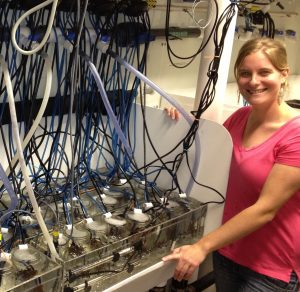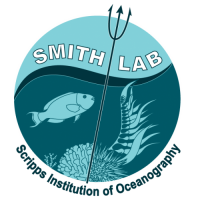by Camila Pauda, Volunteer Programs Assistant
Every month, the third Saturday is a special day at Birch Aquarium: SEA Days! As the tagline suggests, SEA Days are always full of “Science, Exploration and Adventure.” Visitors and members can meet a Scripps Institution of Oceanography researcher and get hands-on with Scripps science, participate in activity stations, and get creative with a thematic craft.

Susan Kram with Plocamium cartilagineum ocean acidification and warming experiment
Chances are that you have heard conversations in your community or on the news about climate change and ocean acidification. Do you have questions about climate change and want to know more about current research? Are you curious about local research on ocean acidification? March’s SEA Days, Sea Changes, is your perfect opportunity to explore this topic! Saturday, March 15 at Birch Aquarium is all about ocean acidification and its effects on marine life.
Susan Kram, a research associate in the Smith Lab at Scripps Institution of Oceanography, will be our visiting scientist for the day. She studies the effects of ocean acidification on temperate macroalgae in addition to managing the Scripps Water Acidity Monitoring Program (SWAMP). I recently sat down with Susan to “dive deeper” into her journey through the field of marine biology and what she will be bringing to SEA Days!
Where did you go to college?
I graduated with a BS in Biology from UC San Diego and graduated with an MS in Marine Biology from Scripps Institution of Oceanography.
What is your area of research?
I research the effects of ocean acidification on seaweeds and monitor ocean acidification off the Scripps Pier.
Who or what inspired you to become involved in marine science?
I have always loved the ocean and when I was a kid I wanted to grow up to be a marine biologist. My parents always brought me to beaches, aquariums, and tidepools, so that’s probably why I fell in love with it.
What qualities do you need in order to become a scientist?
Curiosity!
Why is your research topic important?
Ocean acidification is important because it has the potential to affect all marine life, but in different ways, which is why it is vital that researchers keep studying it.
What will you be bringing with you to SEA days?
For SEA Days I hope to explain ocean acidification by first explaining the concept of pH, which is a measurement of acidity. Most people are already aware of pH (even though they may not realize it); I will demonstrate this using common household items. My station will also include some local San Diego seaweeds and I will demonstrate how different species will be affected differently by ocean acidification. Lastly, I will discuss efforts being made here at Scripps to monitor ocean acidification off the Scripps Pier.
What is the best advice you have for people interested in becoming involved in your field of research?
Find a science organization that appeals to you and volunteer there! It’s the best way to develop skills and get some hands-on experience. Spend time in and around the ocean. Watch the world around you and let your curiosity flow!
What is your favorite ocean organism?
Sea hare!
Join us on Saturday, March 15 for SEA Days: Sea Changes—there’s something for everyone!
SEA Days are 11 a.m – 3 p.m., are included with aquarium admission, and always free to aquarium members. Not a member? Join today!
SEA you there!

